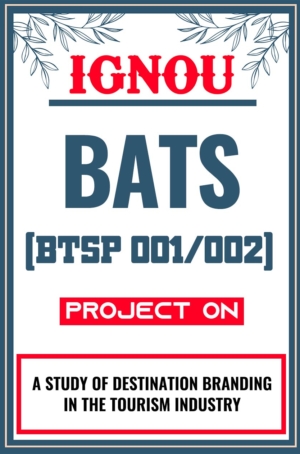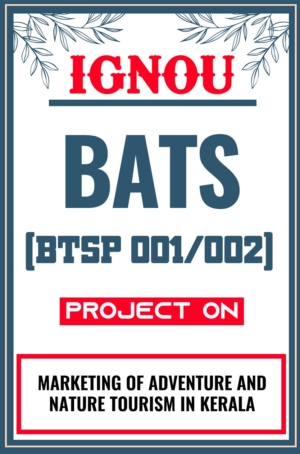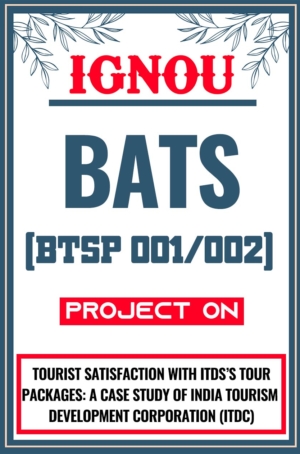IGNOU BTSP 001 Project for BATS
The IGNOU BTSP 001 Project is an important component of the BATS (Bachelor of Arts in tourist Studies) Program, which is designed for people who desire to work in the travel and tourist industry at any level they want. The program’s goals are to teach you about many aspects of tourism, raise awareness about tourism, provide you with basic training in organizing tourism services, and assist you in finding work, all of which should be reflected in the IGNOU BTSP 001 project.
The curriculum will assist people who desire to work (directly or indirectly) in the tourism industry, get employment in the tourism industry, run their own businesses that provide tourism-related services, or start their own business. The IGNOU BTSP 001 Project will also benefit those who work on tourism awareness programs or are studying and wish to improve their travel and tourism knowledge and skills.
Whatsapp us to get the Personalized (Customized) IGNOU BTSP 001 Project Report and Synopsis for BATS
What is the main objective of the IGNOU BTSP 001 Project?
The main objective of the BTSP 001 project at IGNOU is to provide students with practical experience and research skills in the tourism sector. The project aims to:
- Apply Theoretical Knowledge: Enable students to apply the theoretical concepts learned during their coursework in real-world tourism settings.
- Develop Research Skills: Foster the ability to conduct systematic research, including data collection, analysis, and interpretation related to tourism.
- Enhance Practical Understanding: Provide hands-on experience in various aspects of tourism, such as management, marketing, and sustainability.
- Promote Critical Thinking: Encourage students to analyze and address challenges within the tourism industry through critical thinking and problem-solving.
- Contribute to the Field: Allow students to contribute original findings and insights to the field of tourism studies, potentially influencing industry practices and policies.
Can you conduct your IGNOU BTSP 001 Project research outside your city or country?
Yes, you can conduct your research outside your city or country for the BTSP 001 project at IGNOU. However, there are several factors you should consider:
- Relevance: Ensure that the chosen location is relevant to your research topic and objectives. The location should provide valuable insights and data for your study.
- Feasibility: Consider the feasibility of conducting research in the chosen location, including travel arrangements, accommodation, and access to resources.
- Permissions and Approvals: Obtain necessary permissions from local authorities, organizations, or institutions in the chosen location. Ensure that your project supervisor and IGNOU approve your plan.
- Ethical Considerations: Adhere to ethical guidelines, including obtaining informed consent from participants and ensuring their confidentiality and safety.
- Logistics and Budget: Plan your logistics and budget carefully. Consider travel costs, accommodation, and other expenses associated with conducting research outside your city or country.
- Safety: Prioritize your safety and stay informed about the local conditions and regulations of the chosen location.
- Support and Supervision: Maintain regular communication with your project supervisor and seek their guidance throughout your research. Ensure you can manage any issues that arise during your research.
Samples of IGNOU BTSP 001 Project Topics for BATS
- Increase In Tourism Of Kerala
- Potentials And Attractions Of Pilgrimage Tourism In Delhi
- Health Tourism In India: An Exploratory Study
- To Study Of Marketing Strategies For The Development Of Tourism
- Tourist Satisfaction With Itdc Tour Packages: A Case Study Of India Tourism Development Corporation (Itdc) New Delhi
- Marketing Of Adventure And Nature Tourism
- A Study Of Destination Branding In The Tourism Industry
- Effect Of The Internet On The Marketing Of Hotels And Tour Operators In City New Delhi
- To Study The Tourism Possibilities In The Poonch Sector
- Government Policies Adopted For The Promotion Of Tourism In Jammu And Kashmira Study About Religious Sites Of Jammu & Kashmir For Pilgrimage Tourism
- A Study To Analyze The Influence Of Tourism On The Environmental Conditions In The City New Delhi
What methods can you use for data collection?
For the BTSP 001 project at IGNOU, you can use a variety of methods for data collection. The choice of method will depend on your research objectives, the nature of your study, and the type of data you need. Here are some common data collection methods:
Surveys and Questionnaires:
- Online Surveys: Use tools like Google Forms, SurveyMonkey, or Qualtrics to collect data from a large number of respondents.
- Paper Surveys: Distribute printed questionnaires to collect responses in person.
Interviews:
- Structured Interviews: Use a set of predetermined questions to gather quantitative data.
- Semi-Structured Interviews: Combine structured questions with open-ended questions to gather both quantitative and qualitative data.
- Unstructured Interviews: Conduct informal interviews with open-ended questions to gather in-depth qualitative data.
Observations:
- Participant Observation: Actively engage in the environment you are studying to observe behaviors and interactions.
- Non-Participant Observation: Observe the environment without direct interaction to gather data unobtrusively.
- Ethnographic Observation: Spend an extended period in the field to gain a deep understanding of the context and culture.
Focus Groups:
- Organize group discussions with selected participants to gather diverse perspectives on your research topic.
Case Studies:
- Conduct in-depth analysis of specific cases or examples relevant to your research topic.
Secondary Data:
- Use existing data from sources such as government reports, academic articles, industry publications, and online databases.
Content Analysis:
- Analyze textual, visual, or audio content from sources like websites, social media, advertisements, and brochures.
Field Visits:
- Conduct visits to tourist sites, attractions, or organizations to collect firsthand data and observations.
Diaries and Journals:
- Ask participants to maintain diaries or journals to record their experiences and observations over a period of time.
Experiments:
- Design experiments to test specific hypotheses or understand causal relationships.
Mixed Methods:
- Combine multiple data collection methods to gain a comprehensive understanding of your research topic.
What if your IGNOU BTSP 001 Project findings differ from your initial expectations?
If your project findings differ from your initial expectations in the BTSP 001 project at IGNOU, it’s important to approach the situation constructively. Here’s what you can do:
Steps to Handle Unexpected Findings
Acknowledge and Document:
- Clearly document the unexpected findings.
- Acknowledge that research often reveals new insights and that deviation from initial expectations are a normal part of the research process.
Analyze the Data:
- Re-examine your data collection and analysis methods to ensure their accuracy.
- Verify that the data was collected and interpreted correctly.
Interpret the Findings:
- Consider alternative explanations for your findings.
- Reflect on any external factors that may have influenced the results.
Compare with Literature:
- Compare your findings with existing literature to see if similar results have been reported by other researchers.
- Look for patterns, contrasts, or corroborations in previous studies.
Adjust Your Perspective:
- Be open to adjusting your initial hypotheses or research questions based on the new data.
- Use the unexpected findings to refine your understanding of the topic.
Discuss Implications:
- Discuss the implications of your findings in the context of your research objectives and the broader field of study.
- Highlight the significance of your results and how they contribute to the existing body of knowledge.
Seek Feedback:
- Discuss your findings with your project supervisor and peers.
- Seek their feedback and perspectives to gain further insights.
Update Your Report:
- Ensure that your final project report accurately reflects your findings, including the unexpected results.
- Explain any deviations from initial expectations and provide a thorough analysis and discussion.
Who can you contact if you have administrative questions about the IGNOU BTSP 001 Project?
If you have administrative questions about the BTSP 001 project at IGNOU, you can contact several key individuals and departments:
1. Project Supervisor:
- Your project supervisor is your primary contact for guidance on project-related queries, including administrative aspects.
2. Study Centre Coordinator:
- The coordinator at your designated IGNOU study centre can assist with administrative questions, such as submission deadlines, project guidelines, and report formatting.
3. Regional Centre:
- Contact your regional centre for administrative support, including enrolment issues, submission procedures, and project approval processes. You can find the contact details of your regional centre on the IGNOU website.
4. School of Tourism and Hospitality Services Management (SOTHSM):
- This is the specific school within IGNOU responsible for the BATS program. They can provide detailed information about project requirements and administrative procedures. You can reach out to them via email or phone.
5. IGNOU Helpline:
- The general IGNOU helpline can also provide assistance or direct you to the appropriate department for your administrative queries. Check the IGNOU website for helpline numbers and email addresses.
6. Student Service Centre:
- The Student Service Centre at IGNOU can help with administrative issues related to student records, project submissions, and general inquiries.
What are the benefits of using a mixed-methods approach in tourism research for IGNOU BTSP 001 Project?
Using a mixed-methods approach in tourism research offers several benefits by combining both quantitative and qualitative data collection and analysis techniques. This approach provides a more comprehensive understanding of tourism phenomena. Here’s a detailed look at the benefits:
1. Comprehensive Insights
- Quantitative Data: Provides numerical data that can be analyzed for statistical trends and patterns, such as tourist demographics, expenditure, and satisfaction levels.
- Qualitative Data: Offers in-depth insights into tourists’ experiences, motivations, and perceptions, capturing the nuances that quantitative data might miss.
2. Enhanced Validity
- Combining methods can enhance the validity of your findings. Qualitative data can help explain or provide context to quantitative results, and vice versa, increasing the overall robustness of the research.
3. Rich Data Interpretation
- Depth and Breadth: Quantitative data gives a broad overview, while qualitative data adds depth. For example, while surveys might reveal that tourists are generally satisfied with a destination, interviews can uncover the specific reasons behind this satisfaction.
- Triangulation: Using multiple methods allows for triangulation, which helps confirm findings and reduces the likelihood of bias or inaccuracies.
4. Flexible Research Design
- Adaptability: Researchers can adapt their approach as the study progresses. Initial qualitative findings might lead to new hypotheses that can be tested quantitatively.
- Complementary Strengths: Qualitative data can help design better surveys or experiments by identifying relevant variables and insights that are not immediately apparent.
5. Improved Understanding of Complex Phenomena
- Complex Issues: Tourism research often involves complex social and cultural phenomena that benefit from a multifaceted approach. Mixed methods can address these complexities more effectively than using a single method alone.
- Contextual Insights: Qualitative data can provide context and background for quantitative findings, helping to interpret trends and patterns within a broader framework.
6. Increased Reliability
- Cross-Verification: The mixed-methods approach allows for cross-verification of data. For instance, qualitative interviews can validate survey findings, enhancing the reliability of results.
7. Greater Detail
- Detailed Findings: Qualitative methods can uncover details about tourist behaviors, experiences, and preferences that quantitative surveys might overlook.
- Exploration of Unexpected Results: If quantitative data reveals unexpected results, qualitative methods can explore these anomalies in more depth.
8. Enhanced Recommendations
- Practical Solutions: By integrating both types of data, researchers can provide more nuanced and actionable recommendations for tourism management, policy, and marketing strategies.
9. Broader Audience Appeal
- Diverse Perspectives: Mixed methods cater to a broader audience, including those interested in quantitative trends and those seeking qualitative insights.
- Stakeholder Engagement: Findings from a mixed-methods approach can appeal to various stakeholders, including policymakers, industry professionals, and academic researchers.
Ready to get your IGNOU BTSP 001 Project Report and Synopsis Sample PDF for BATS?
- Call us or WhatsApp us at: 9958947060, 9354637830
- Visit: SHRICHAKRADHAR.COM
-
Sale!

-
Sale!

IGNOU BATS Project (BTSP 001/002) Synopsis/Proposal & Project Report/Dissertation in Soft-Copy (Sample-7)
Original price was: ₹499.00.₹149.00Current price is: ₹149.00. -
Sale!

IGNOU BATS Project (BTSP 001/002) Synopsis/Proposal & Project Report/Dissertation in Soft-Copy (Sample-6)
Original price was: ₹499.00.₹149.00Current price is: ₹149.00. -
Sale!

IGNOU BATS Project (BTSP 001/002) Synopsis/Proposal & Project Report/Dissertation in Soft-Copy (Sample-5)
Original price was: ₹499.00.₹149.00Current price is: ₹149.00. -
Sale!

IGNOU BATS Project (BTSP 001/002) Synopsis/Proposal & Project Report/Dissertation in Soft-Copy (Sample-4)
Original price was: ₹499.00.₹149.00Current price is: ₹149.00. -
Sale!

IGNOU BATS Project (BTSP 001/002) Synopsis/Proposal & Project Report/Dissertation in Soft-Copy (Sample-3)
Original price was: ₹499.00.₹149.00Current price is: ₹149.00. -
Sale!

IGNOU BATS Project (BTSP 001/002) Synopsis/Proposal & Project Report/Dissertation in Soft-Copy (Sample-2)
Original price was: ₹499.00.₹149.00Current price is: ₹149.00. -
Sale!

IGNOU BATS Project (BTSP 001/002) Synopsis/Proposal & Project Report/Dissertation in Soft-Copy (Sample-1)
Original price was: ₹499.00.₹149.00Current price is: ₹149.00.








